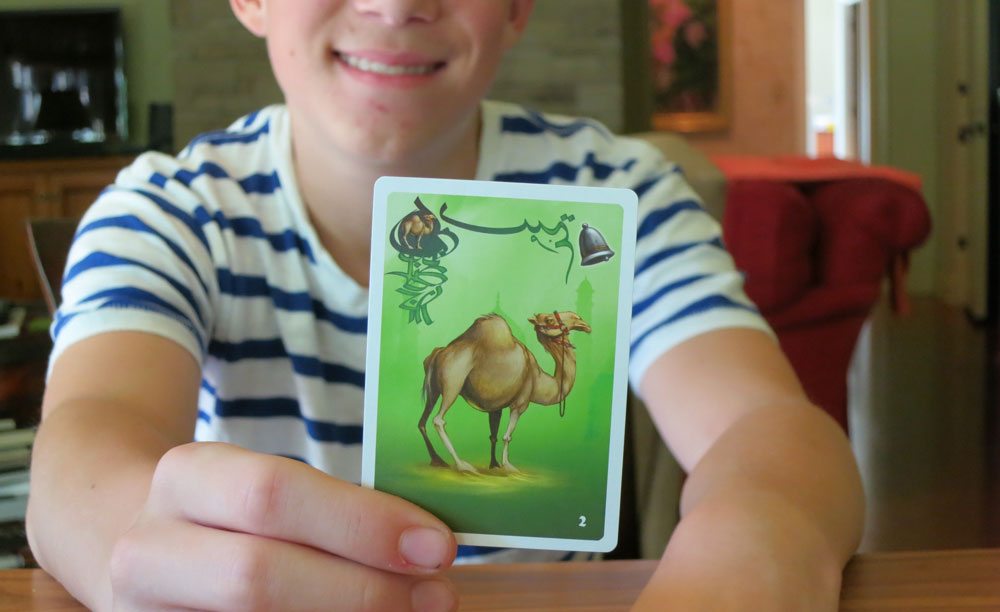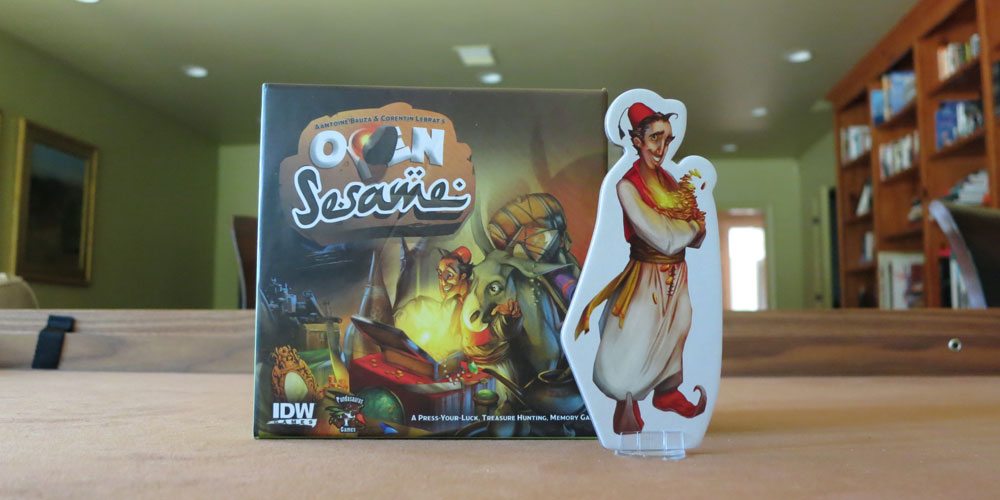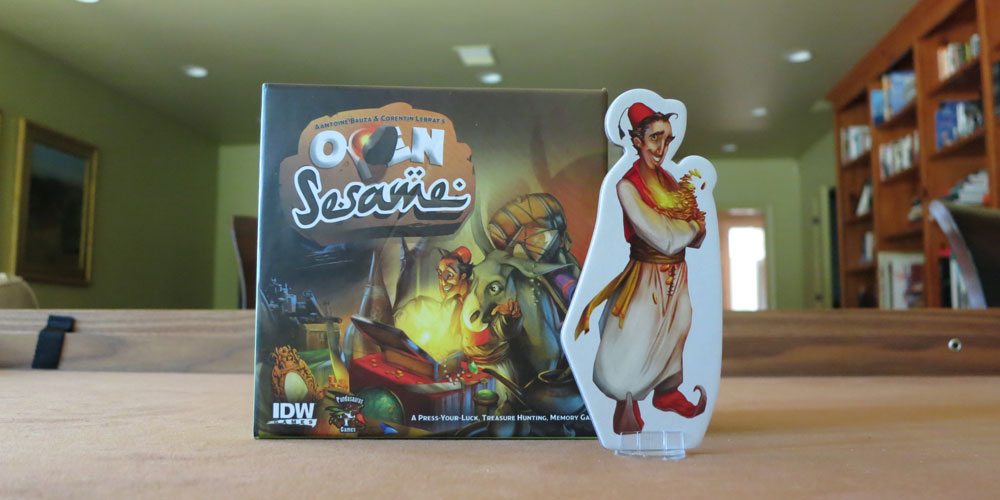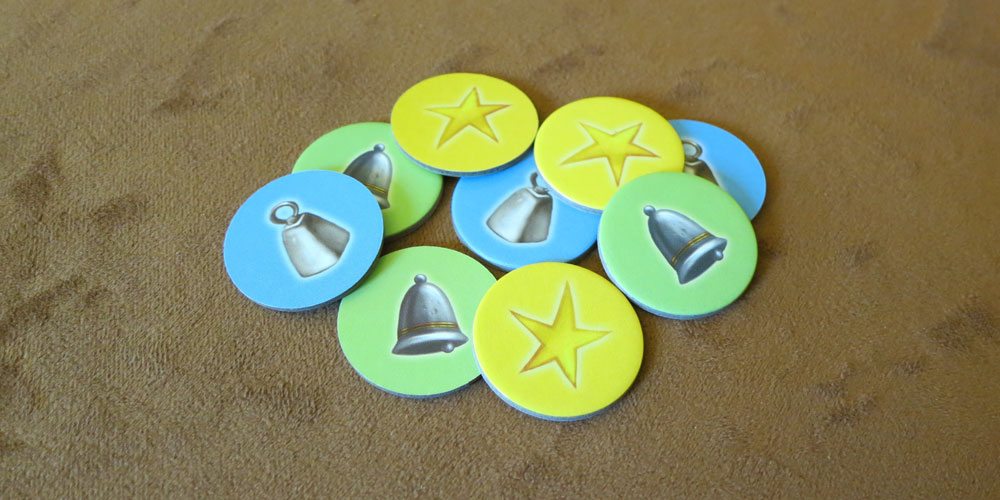Open Sesame is a quick and fairly simple memory game that involves some press-your-luck decisions. The game was designed by Antoine Bauza (7 Wonders, Takenoko, Hanabi) and Corentin Lebrat (Takenoko: Chibis) and is a game for the whole family, recommended for 3-5 players aged 8 and up (though younger can easily play) and plays in about 10 or 15 minutes. This version, published by IDW Games, is nearly identical to a previous edition named Ali.
Summary
Players take turns in the role of Ali Baba, revealing treasures hidden in a cave. The other players, as thieves, have to memorize what has been shown and recite the items in order to get a share of the loot. There are several ways to gather treasure and Ali Baba has to be careful he doesn’t reveal too much!
Components
This is a small game, but the components are high quality. There are 45 Treasure cards, a Chief Thief card, which marks the final round, 9 alarm tokens, and a standee of Ali Baba, which could be left behind if you want to play lightly, but even with the standee Open Sesame is a game that could easily fit in your pocket.
The art by Stéphane Poinsot (Formula D, Werewolves of Miller’s Hollow) is top-notch and really supports the Arabic theme. The artwork is comical, but has an almost dreamlike quality to it. Very nice.
Among the 45 Treasure cards, there are 22 different faces, broken into four specialty groups: shiny (9 cards), loud (7), encumbering or heavy (5), and standard objects (24). Card faces vary between a single card for some objects, up to one card that has four incidences in the deck. Most cards have 1 or 2 additional copies.

Setup and Gameplay
Shuffle the Treasure cards and count eight cards off the bottom of the deck. Place the Chief Thief on top of these eight and replace them at the bottom of the deck. Once the Chief Thief is revealed, this signals the final round of play.
A first player is chosen to be Ali Baba. He reveals the card on the top of the deck and shows it to all players. Ali Baba then hides the revealed card in his hand, only for him to see. The player to his right states what is in the cavern, “In the cavern there is a…”
The order is unimportant, but Ali Baba must make sure all of the previously revealed cards are mentioned. The only other rule about recitation is that, if two of an item have been revealed, each thief must state them in groups, “there are two flutes…” Play goes around the table until one of three conditions occur:
- After a thief has correctly identified the items, Ali Baba can say “Open Sesame” and end the round. Beginning with Ali Baba, the thieves take turns choosing a card from the revealed cards and placing them, face-down, in front of them. This continues until all cards have been taken. After placing them in front of themselves, players may not look at cards they have taken from the cavern.
- A thief makes a mistake in the recitation. In this case, Ali Baba gets to choose three cards from the revealed cards, then each thief (including Ali Baba as the distribution rotates around the table), except the thief who made a mistake, gets to take a card and place it face-down in front of him.
- As described in the components, there are a number of shiny, heavy, and loud cards. As Ali Baba reveals cards, if one of these cards comes up, he must take a corresponding token for each card in one of these categories revealed. If Ali Baba reveals enough specialty cards to gather three tokens of any category or a single token from each group, the round ends and each thief except Ali Baba gets to take turns choosing from the revealed cards until they are gone.
Play continues with players taking turns playing the role of Ali Baba and reciting what’s in the cavern until the Chief Thief comes up in the deck. This card signals that the round will be the last. The Chief Thief must also be counted in the recitation. At the end of the game, players reveal the cards in front of them and score one point for each different card they have. Duplicates are not counted.
Verdict
Open Sesame is a fairly simple filler game, but it’s actually very fun and one that you can really enjoy with younger kids. There’s something about memory games that is very enjoyable, but at the same time stressful. As we get older and our memories starts to fade, this is the kind of game where kids can pretty consistently win.
The press-your-luck aspect of it, for the player who is Ali Baba that round, is a nice twist and one that can cause some tough decisions and potentially turn the game around on the reveal of a single card. If you have two different tokens in front of you or two of the same (or worse yet, both!) do you keep going? It’s hard to decide sometimes. For the thieves, the facts that duplicates don’t count and that players can’t look at their “won” cards creates a second memory game, as they try to remember what they already have in their piles. Sometimes the list of articles in your pile bleeds over to the cards you’re trying to remember for Ali Baba, so be careful!
There are a couple of variants to make this game even more accessible to players at either end of the spectrum. For younger players or those who are novices, Ali Baba can reveal the Treasure cards as the thief recites them. At the conclusion, Ali Baba picks them up for the next thief, but the visual reinforcement can help those with more challenged memories. For the more experienced players, the rulebook suggests adding an adjective to the recitation. For example, “a sharp sword” or a “ferocious lion.” The adjective must be consistent through the round. Another option is to always recite the Treasures in the right order.
We really enjoyed Open Sesame, maybe because memory games are mostly egalitarian. High strategy games benefit certain types of thinkers, but memory games are a straight-up skills test. However, the press-your-luck element helps to counteract players who might run away with a game. We seemed to have a different winner almost every time we played. It’s a lot of fun and games like Open Sesame have been proven to help memory and other cognitive skills, so give Open Sesame a whirl. Enough plays and the game may actually help you remember where you left your car keys.
Open Sesame is in stores now and retails for $19.99.
Disclosure: GeekDad received a sample of this game for review purposes.




